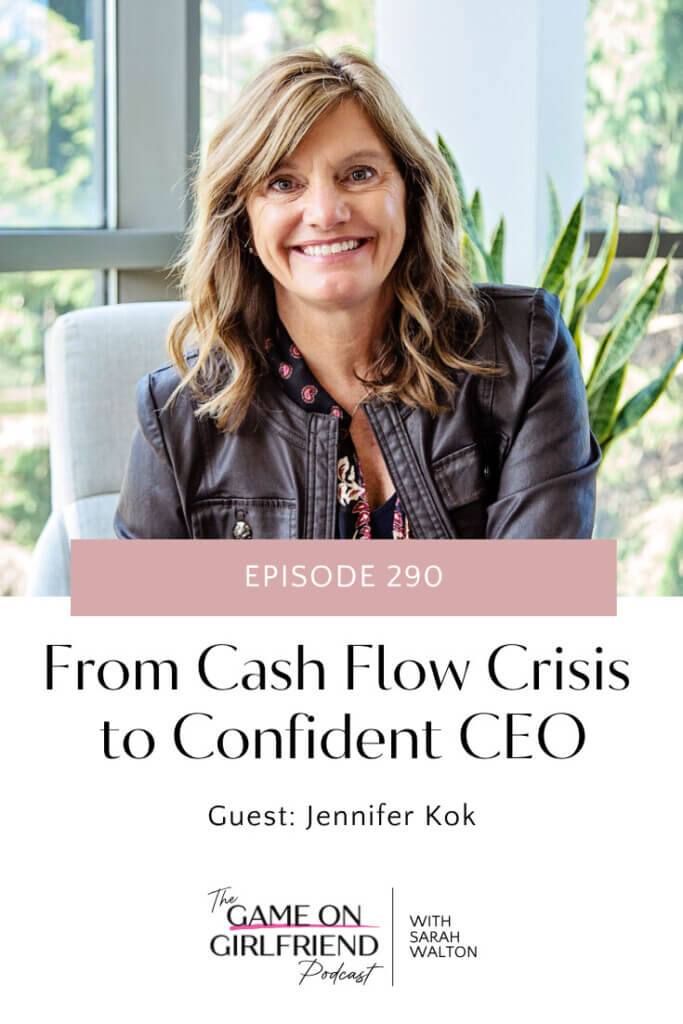Episode 290: From Cash Flow Crisis to Confident CEO with Jennifer Kok

When Jennifer Kok opened her cookie business, she gave birth to her second daughter just two days later. Her husband literally picked her up from the hospital with cookie bouquets in the backseat that needed immediate delivery. That chaotic beginning set the tone for what would become a 20-year entrepreneurial journey filled with massive wins, devastating pitfalls, and hard-earned wisdom about why small businesses really close their doors.
The statistics tell us that 50% of small businesses fail within their first five years. But after coaching hundreds of entrepreneurs and experiencing her own business crisis, Jennifer has discovered something crucial: small businesses don't fail—they quit.
The Messy Middle: When Entrepreneurs Hit the Wall
Around year three or four, a predictable phenomenon occurs in most entrepreneurs. Jennifer calls it "the messy middle"—that challenging period when the initial excitement has worn off, the warm market of friends and family has dried up, and reality sets in about what it really takes to build a sustainable business.
During this phase, entrepreneurs often find themselves:
- Working harder but earning less than their previous corporate salary
- Questioning whether they're cut out for business ownership
- Feeling isolated and overwhelmed by the daily demands
- Comparing themselves to others who appear more successful
- Losing confidence in their abilities and business vision
This is when many business owners begin to think that returning to corporate life would be easier. And unfortunately, this is when they quit—often right before they could have achieved their breakthrough.
The Phone Call That Changed Everything
Jennifer experienced her own version of the messy middle five years into running her cookie business. During a family vacation, her manager called with devastating news: paychecks were bouncing.
"I had to pull over and take a cash advance on a credit card to make payroll," Jennifer recalls. "The shame was crushing. But here's the thing—revenue was actually growing. I just didn't understand cash flow management."
That humbling moment became the catalyst for learning proper business fundamentals. Instead of quitting, Jennifer got help and developed systems that transformed her approach to business finances.
The Power of Your Personal Board of Directors
One of the most critical factors that separates entrepreneurs who quit from those who persevere is having the right support system. Jennifer recommends building what she calls your "personal board of directors"—five specific types of people who can guide you through the challenging moments:
1. The Experienced Mentor - Find someone older who has been through similar challenges. They provide the calming presence and perspective that reminds you this is normal and temporary.
2. The Fresh Perspective - Include someone younger who brings energy and keeps you relevant. This person can help you stay connected to current trends and remind you that you're on the right track.
3. The Industry Peer - Don't be threatened by others in your field. Collaborate with fellow business owners who truly understand what you're going through because they face similar challenges.
4. The Outside Observer - Bring in someone from a completely different industry. They can offer insights and ideas that you might never consider from within your own business bubble.
5. The Trusted Confidant - Everyone needs that friend who will listen without trying to fix everything. Sometimes you just need someone to be a container for your thoughts and feelings.
Working ON Your Business, Not Just IN It
When entrepreneurs hit the messy middle, Jennifer's counterintuitive advice is to take a step back and evaluate all areas of the business. This means shifting from working in your business to working on your business—a concept that can feel scary when you're used to being the primary doer.
Start with Your Numbers
Many business owners come to Jennifer saying, "It's not working," but when they examine the actual numbers, the situation often isn't as dire as it feels. Understanding your exact financial position is the foundation for making informed decisions about your business direction.
Focus on Profit, Not Just Revenue
Jennifer frequently works with service-based entrepreneurs who are barely making money despite appearing busy. In one case, she helped a photographer realize she was earning only about two dollars per hour when all her time and expenses were factored in.
"You need to know your profit margins," Jennifer emphasizes. "Once you can confidently price your services to make good money, you can go to market with confidence."
Find Your Micro Audience
Instead of trying to serve everyone, successful entrepreneurs narrow their focus to a specific audience. This may seem counterintuitive—many fear they'll lose potential customers—but targeting a micro-audience actually makes marketing more effective and less exhausting.
The Isolation Problem in Entrepreneurship
Unlike traditional employees who can walk down the hall for a pep talk or bounce ideas off coworkers, entrepreneurs often work in isolation. This loneliness can become dangerous when self-doubt begins to creep in.
"We don't have bosses. We don't have coworkers," Jennifer explains. "When you start to spiral and think about the what-ifs, having core people you really trust can make all the difference."
The conversations we have daily shape our mindset and confidence. Surrounding yourself with other entrepreneurs who understand the journey helps normalize the challenges. It provides practical solutions from people who have faced similar situations.
The Truth About "Entrepreneur Porn"
Jennifer is passionate about combating what she calls "entrepreneur porn"—the unrealistic portrayal of business success on social media. Stories of seven-figure launches and overnight success create dangerous expectations for new entrepreneurs.
"What they're not telling you is they spent more than they made to hit that number," she points out. "It's not about what you make—it's about profit."
This unrealistic messaging contributes to the epidemic of entrepreneurs quitting because they feel like failures when they don't achieve instant, dramatic results. Building a sustainable business takes time, patience, and consistent effort, not just adding water to an instant success formula.
Practical Steps to Avoid Becoming a Statistic
If you're feeling like you might be approaching your own messy middle, here are Jennifer's practical recommendations:
1. Conduct a Business Breakthrough Strategy
Evaluate all areas of your business, starting with your numbers. Look at what's actually working versus what feels like it's not working.
2. Calculate Your True Profit Margins
Understand exactly how much you're making per hour or per project. If the numbers don't work, adjust your pricing or processes before burnout sets in.
3. Build Your Support System
Actively recruit your personal board of directors. Don't wait until you're in crisis mode to start building these relationships.
4. Focus on Fundamentals Over Shiny Objects
Resist the urge to chase the latest marketing strategy or business tool. Master the basics of cash flow, customer service, and consistent delivery first.
5. Give Yourself Permission to Work ON Your Business
Schedule regular time for strategic thinking and planning, not just daily operations.
The Mindset Shift That Changes Everything
Perhaps the most important insight from Jennifer's journey is recognizing that business challenges aren't character flaws—they're navigation points toward better systems. When entrepreneurs can shift from "What's wrong with me?" to "What needs to be improved in my business?" they transition from a place of shame to one of empowerment.
"Your business challenges aren't personal failures," Jennifer reminds us. "They're signals pointing toward where you need better systems or support."
Why Your Business Matters
Small businesses are the heart and soul of communities. They're run by people who show up at nonprofits, volunteer at local events, and create jobs for their neighbors. When entrepreneurs quit prematurely, communities lose these vital contributors.
"Women who make good money go on to do great things," Jennifer believes. "There's this block about paying themselves, but most entrepreneurs have big hearts. They're not going to hoard that money—they're going to use it to make a positive impact."
The Bottom Line
If you're in the messy middle of entrepreneurship—feeling stuck, questioning your abilities, or wondering if it's time to throw in the towel—remember that this is a normal part of the journey. The difference between those who quit and those who break through often comes down to having the right support system and focusing on business fundamentals rather than getting caught up in comparison or perfectionism.
Your business challenges don't define your worth as an entrepreneur. They're simply information about what needs attention. With the right guidance, support, and strategic approach, you can navigate through the messy middle and build the profitable, sustainable business you started out to create.
Ready to build your own support system and master the fundamentals of profitable business?
Watch Jennifer Ko's free training "Three Keys to Grow a Profitable Business" at https://nextwavebusinesscoaching.com/ and start building the foundation for long-term business success.
Share this post with an entrepreneur who needs to hear this message today.
Connect with Jennifer Kok:
Binge More Game On Girlfriend™ Podcast Episodes
GRAB MY FREE FREEDOM CALCULATOR SO YOU CAN:

Learn the exact number you need to feel FREE!
Know exactly what you need to do each day to make more money.
Make tracking your numbers easy with my revenue tracking tool (the same tool I use every day in my own business!)
Learn the TOP 2 mistakes most business owners make when it comes to tracking revenue
It's time to move from "fingers crossed" to clear and successful.



